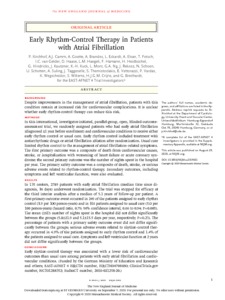Kirchhof, P;
Camm, AJ;
Goette, A;
Brandes, A;
Eckardt, L;
Elvan, A;
Fetsch, T;
van Gelder, IC;
Haase, D;
Haegeli, LM;
et al.
Kirchhof, P; Camm, AJ; Goette, A; Brandes, A; Eckardt, L; Elvan, A; Fetsch, T; van Gelder, IC; Haase, D; Haegeli, LM; Hamann, F; Heidbüchel, H; Hindricks, G; Kautzner, J; Kuck, K-H; Mont, L; Ng, GA; Rekosz, J; Schoen, N; Schotten, U; Suling, A; Taggeselle, J; Themistoclakis, S; Vettorazzi, E; Vardas, P; Wegscheider, K; Willems, S; Crijns, HJGM; Breithardt, G; EAST-AFNET 4 Trial Investigators
(2020)
Early Rhythm-Control Therapy in Patients with Atrial Fibrillation.
N Engl J Med, 383 (14).
pp. 1305-1316.
ISSN 1533-4406
https://doi.org/10.1056/NEJMoa2019422
SGUL Authors: Camm, Alan John
![[img]](https://openaccess.sgul.ac.uk/112338/1.hassmallThumbnailVersion/nejmoa2019422.pdf)  Preview |
|
PDF
Published Version
Available under License ["licenses_description_publisher" not defined].
Download (560kB)
| Preview
|
Abstract
BACKGROUND: Despite improvements in the management of atrial fibrillation, patients with this condition remain at increased risk for cardiovascular complications. It is unclear whether early rhythm-control therapy can reduce this risk. METHODS: In this international, investigator-initiated, parallel-group, open, blinded-outcome-assessment trial, we randomly assigned patients who had early atrial fibrillation (diagnosed ≤1 year before enrollment) and cardiovascular conditions to receive either early rhythm control or usual care. Early rhythm control included treatment with antiarrhythmic drugs or atrial fibrillation ablation after randomization. Usual care limited rhythm control to the management of atrial fibrillation-related symptoms. The first primary outcome was a composite of death from cardiovascular causes, stroke, or hospitalization with worsening of heart failure or acute coronary syndrome; the second primary outcome was the number of nights spent in the hospital per year. The primary safety outcome was a composite of death, stroke, or serious adverse events related to rhythm-control therapy. Secondary outcomes, including symptoms and left ventricular function, were also evaluated. RESULTS: In 135 centers, 2789 patients with early atrial fibrillation (median time since diagnosis, 36 days) underwent randomization. The trial was stopped for efficacy at the third interim analysis after a median of 5.1 years of follow-up per patient. A first-primary-outcome event occurred in 249 of the patients assigned to early rhythm control (3.9 per 100 person-years) and in 316 patients assigned to usual care (5.0 per 100 person-years) (hazard ratio, 0.79; 96% confidence interval, 0.66 to 0.94; P = 0.005). The mean (±SD) number of nights spent in the hospital did not differ significantly between the groups (5.8±21.9 and 5.1±15.5 days per year, respectively; P = 0.23). The percentage of patients with a primary safety outcome event did not differ significantly between the groups; serious adverse events related to rhythm-control therapy occurred in 4.9% of the patients assigned to early rhythm control and 1.4% of the patients assigned to usual care. Symptoms and left ventricular function at 2 years did not differ significantly between the groups. CONCLUSIONS: Early rhythm-control therapy was associated with a lower risk of cardiovascular outcomes than usual care among patients with early atrial fibrillation and cardiovascular conditions. (Funded by the German Ministry of Education and Research and others; EAST-AFNET 4 ISRCTN number, ISRCTN04708680; ClinicalTrials.gov number, NCT01288352; EudraCT number, 2010-021258-20.).
| Item Type: |
Article
|
| Additional Information: |
From New England Journal of Medicine, Kirchhof, P; Camm, AJ; Goette, A; Brandes, A; Eckardt, L; Elvan, A; Fetsch, T; van Gelder, IC; Haase, D; Haegeli, LM; et al., Early Rhythm-Control Therapy in Patients with Atrial Fibrillation, 383:1305-1316. Copyright © 2020 Massachusetts Medical Society. Reprinted with permission. |
| Keywords: |
EAST-AFNET 4 Trial Investigators, 11 Medical and Health Sciences, General & Internal Medicine |
| SGUL Research Institute / Research Centre: |
Academic Structure > Molecular and Clinical Sciences Research Institute (MCS) |
| Journal or Publication Title: |
N Engl J Med |
| ISSN: |
1533-4406 |
| Language: |
eng |
| Dates: |
| Date | Event |
|---|
| 1 October 2020 | Published | | 29 August 2020 | Published Online |
|
| Publisher License: |
Publisher's own licence |
| Projects: |
|
| PubMed ID: |
32865375 |
 |
Go to PubMed abstract |
| URI: |
https://openaccess.sgul.ac.uk/id/eprint/112338 |
| Publisher's version: |
https://doi.org/10.1056/NEJMoa2019422 |
Statistics
Item downloaded times since 03 Sep 2020.
Actions (login required)
 |
Edit Item |



